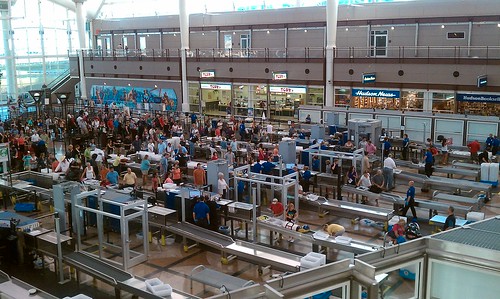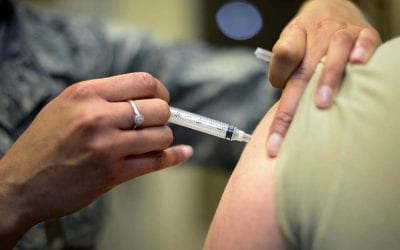There is no doubt that terrorists and criminals come in all shapes, sizes, ages, and races. Some people may even be the unwitting participants in a terrorist act. Therefore, I must agree with TSA, when they say that their security scrutiny must be applied to all.
The question must be asked, however, “How should it be applied to all?”
Before answering that question, let’s take a look at recent situations at TSA security checkpoints.
This past June, Jean Weber’s mother, a frail 95 year old women, in poor health, not quite 5′ tall and weighing barely more than 100 lbs. wanted to fly from Florida to Michigan to visit relatives before moving to an assisted living facility. Because she was in a wheel chair, TSA required a pat-down search.
At TSA security, a TSO (Transportation Security Officer) told Weber’s daughter they found something on the back of her mother’s leg, and they didn’t know what it was. They took her into a private room, and after about a half hour total time in security, told Jean Weber that her mother’s adult diaper was wet, and had a firm area they could not analyze or feel.
At this point, according to Jean Weber, the TSO said she could not complete the security check without the adult diaper off. Clearly TSA was saying to Jean Weber, her mother wouldn’t be cleared to fly unless her adult diaper was removed. Weber told TSA she had no spare with her.
In their statement TSA said,
“While every person and item must be screened before entering the secure boarding area, TSA works with passengers to resolve security alarms in a respectful and sensitive manner. We have reviewed the circumstances involving this screening and determined that our officers acted professionally, according to proper procedure and did not require this passenger to remove an adult diaper.”
Jean Weber agrees that the TSO never ordered the diaper to be removed from her mother. Nevertheless, according to Weber’s account, the TSO said if the diaper wasn’t removed she couldn’t complete the security check, and we all know, if TSA can’t complete their security check of a passenger, the passenger doesn’t get to fly.
As to working with passengers to resolve security alarms in a respectful and sensitive manner, any mother knows that when a diaper gets wet it gets firm where wet.
In my opinion, the TSO should have been analyzing Weber’s mother’s behavior, considering her condition, and should have used commonsense as to why the diaper had a firm spot, and sent her to her gate.
Just last month, 84 year old Lenore Zimmerman, hunched over, walking with a walker, asked to forgo the full body scanner at JFK airport in New York. Zimmerman was concerned it would interfere with her defibrillator.
TSA admits its review of security camera footage showed Zimmerman was asked to remove a back brace she told security personnel she was wearing. At this point, Zimmerman’s account and TSA’s diverge. Zimmerman claims at that point she was “stripped searched.”
TSA states,
“While we regret that the passenger feels she had an unpleasant screening experience, TSA does not include strip searches as part of our security protocols, and one was not conducted in this case.”
The term “strip search” means different things to different people, but if the back brace worn by Zimmerman was anything like the one’s I know, she had to undress to at least some extent to remove it.
I’m wondering why TSA couldn’t have analyzed Zimmerman’s behavior, considered her physical condition, patted her down, perhaps even tested her back brace for explosives the way they test luggage, and sent her to her gate.
Lest you think two out of the thousands and thousands of elderly flying aren’t a big deal, other elderly passengers are beginning to report similar problems.
Ruth Sherman, 88, says that while flying back to Florida last month, TSO screeners made her pull down her pants and underwear and show them her colostomy bag, after they ran their hands over her legs, arms, and the underside of her breasts.
Linda Kallish, 66, of Florida was on the same flight as Lenore Zimmerman. TSO’s sent her into a private room and required her to take her pants off to reveal her glucose monitor and insulin pump, after it set off a metal detector.
Don’t you think each of these passengers had TSA security procedures poorly applied to them?
When my wife and I were recently in Europe and the Middle East, flying through Germany, Turkey and Egypt, security was well enforced, but from what I saw, the elderly were examined with the tact and dignity one would hope TSA would adopt.
Two in our group with medical devices, one with a defibrillator and one with an artificial knee were not subjected to the treatment Jean Webber’s mother, Lenore Zimmerman, Ruth Sherman, or Linda Kallish endured, while ensuring they posed no danger to other passengers.
After many years working in corporate America as a chemical engineer, executive and eventually CFO of a multinational manufacturer, Ned founded a tech consulting company and later restarted NSL Photography, his photography business. Before entering the corporate world, Ned worked as a Public Health Engineer for the Philadelphia Department of Public Health. As a well known corporate, travel and wildlife photographer, Ned travels the world writing about travel and photography, as well as running photography workshops, seminars and photowalks. Visit Ned’s Photography Blog and Galleries.


